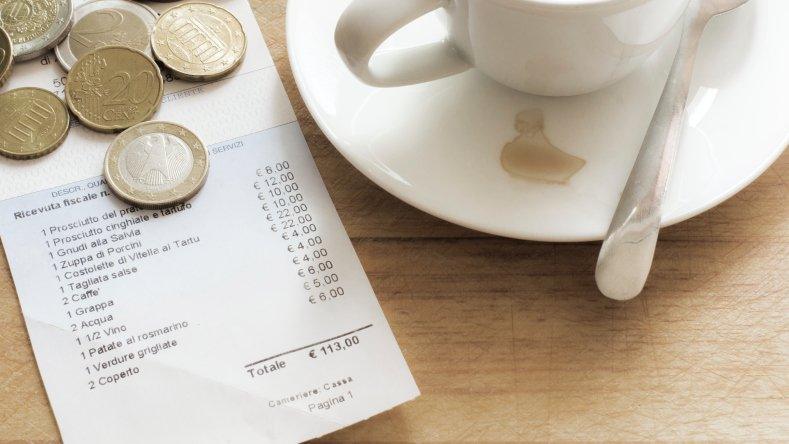France's waiters watch their tips decline
- Published
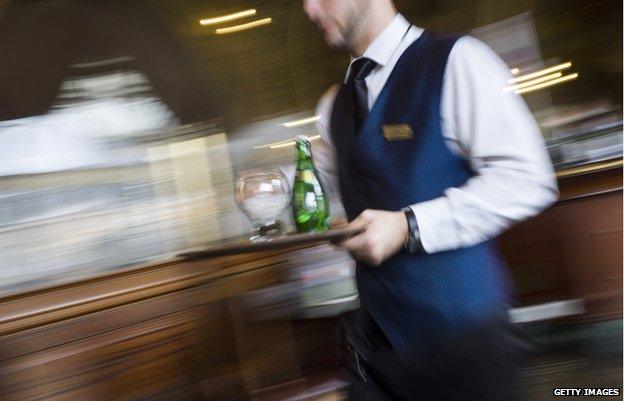
Sitting in front of some grilled goat's cheese on toast, a salad and a friend called Clementine at a pavement cafe in the centre of Paris, Stephanie, 25, makes a face and admits that, no, she doesn't leave tips.
Long the done thing in French cafes and restaurants, leaving a tip appears to be a dying tradition.
"What? Never?" I ask Stephanie. "No, not ever," she says.
"For the older generation it's something they used to do. My generation doesn't even think about it," she says.
A recent survey , externalby web travel guide TripAdvisor shows the number of people who, like Stephanie, will not leave a few euro-cents more than the total marked on their bill even if their waiter dances the Can-can has more than doubled over the past year.
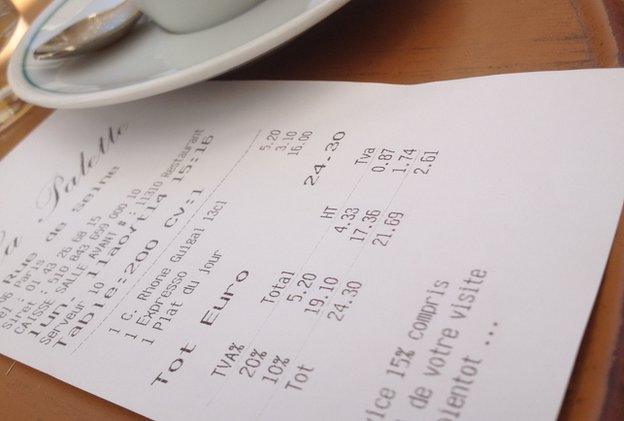
A 15% service charge is added to the bill but not given to the waiter
Fifteen per cent of French customers now never tip, up from 7% last year. And over a third say they leave less than in previous years.
"Maybe it's because French people, who travel more and more, realise that in some countries tips serve to pay for the service, whereas in France waiters, taxi drivers and hairdressers receive a salary," says TripAdvisor's Artine Mackertichian.
In France, a 15% service charge is automatically included in cafe and restaurant bills. This money is not given directly to the waiter but to the restaurant owner who pays his staff a fixed salary.
However France is not Japan, where tipping does not exist and is even considered rude.
French waiters are paid, on average, 1,495 euros (£1,200; $2,000) a month, only a shade more than the statutory minimum wage, and they usually expect some sort of tip.

To tip or not to tip in Paris cafes
In France all prices include service and taxes, with approximately 15% of the price corresponding to the service. But if the waiter or waitress has been especially attentive, you can leave him or her a tip to show your appreciation. Around 5-10% of the bill is usual.

For many waiters, tips are still a significant source of income. Bryan Bouchayer has been waiting tables full time since he was 15 and is now at renowned cafe-restaurant La Palette.
"On a good day I get 200 euros in tips," says Bryan, elegantly attired in the traditional French waiter's garb of black tie, starched white shirt, black waistcoat, black trousers and long white apron.
"On a bad day it's 70, 60, 50." But La Palette is good for tips.
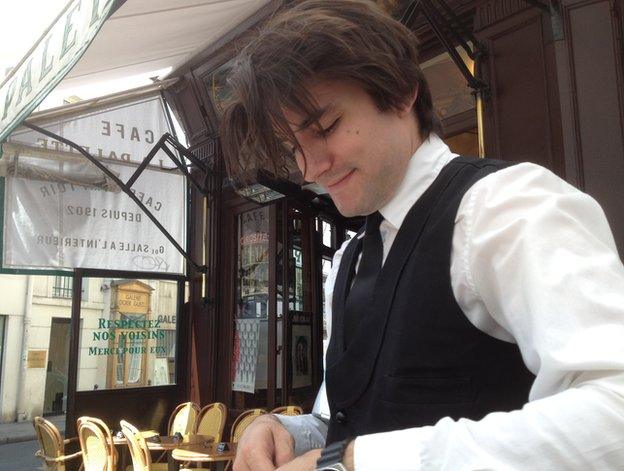
Bryan Bouchayer suggests his fellow waiters might be rude because their customers are
He reckons he's taking about a third less in tips than he was two or three years ago but tips still double his pay.
Men are much better tippers than women and older people are better than the young but the big difference, says Bryan, is between the French and the foreigners.
He has some regular French customers who leave good tips - 10-15% of the bill - his best tippers are the Germans, the English and, of course, the Americans.
And it is the American tourists, TripAdvisor says, who say they tip most:
60% of Americans
49% of Germans
33% of Brazilians
30% of Spaniards
28% of Russians
26% of British
15% of French
11% of Italians
However, according to my straw poll of waiters, foreigners are getting wise to the 15% service charge and reining in their largesse.
On my search for the big-tipping foreigner I met three American families, two British couples and a group of German men in their early twenties.
The Germans were leaving a powerful 15-20%; one of the American families a friendly but restrained 5%; the rest, going native, nothing at all.
So what should French waiters do about the collapse of the tip?
Well, one avenue that might be worth exploring is giving good service.
Paul Derby, a British tourist, tells how he took his family to a restaurant on the west coast of Brittany this month and walked away without leaving a tip because of the waiters' rudeness.
He complained first that he wasn't allowed to choose a menu listed on a board outside, then was ignored for an hour despite the restaurant not being particularly full.
Finally, one of the waiters bringing the dessert tripped up and dropped the dessert on the floor.
I broach the delicate subject of the rude reputation of French waiters with Bryan Bouchayer.
"Do you know why French waiters are so rude?" he asks. "It's because of French customers. They are the worst! They never stop criticising."
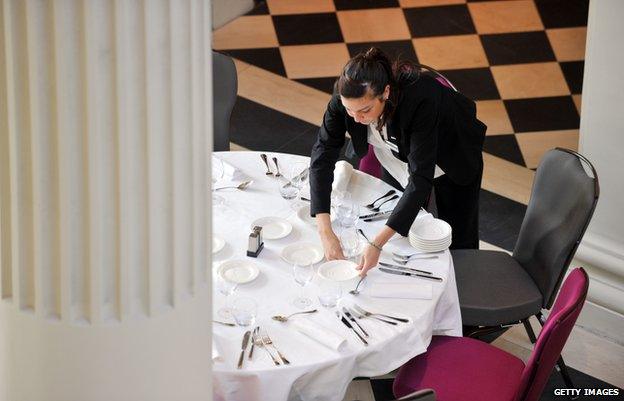
Up the road at La Boissonnerie, the British restaurant manager, Julie Duckett, agrees. A certain amount of rudeness is "de rigueur", she says.
"French customers tend to give you quite a lot of attitude and they expect the waiters to be rude in return," she says.
But the grumpy French waiter may take solace from a study, carried out recently by behavioural psychologist Nicolas Guenguen of South Brittany University, that shows that the link between good service and a good tip is even weaker than previously thought.
Mr Guenguen asked waitresses to dress in different coloured T-shirts.
The women in red received 25% more tips, largely from men.
He then got his waitresses to wait table dressed in dark, red-haired and blond wigs. The women customers were as unmoved as they had been by the red T-shirts but the male customers, again, increased their tips by 25% for the "blondes".
- Published16 July 2014
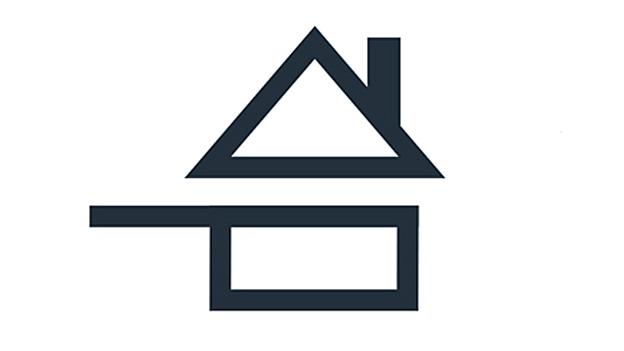
- Published14 June 2013
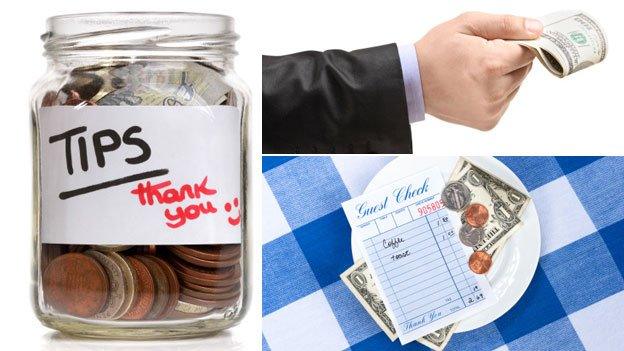
- Published20 June 2013
